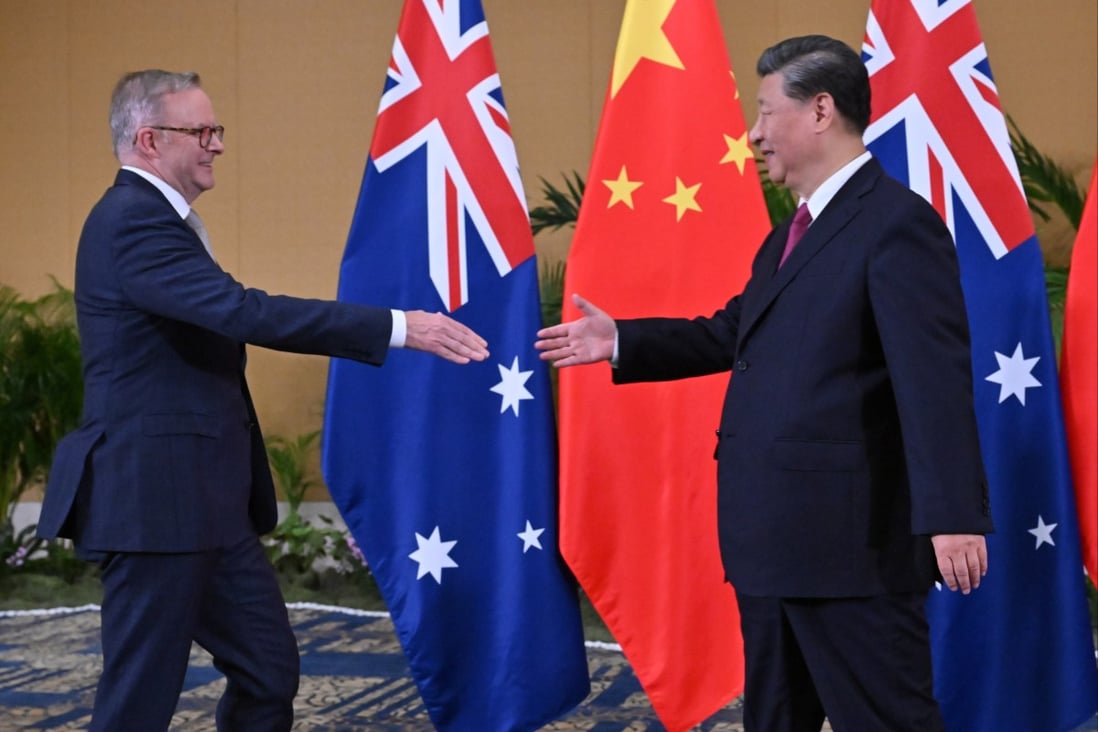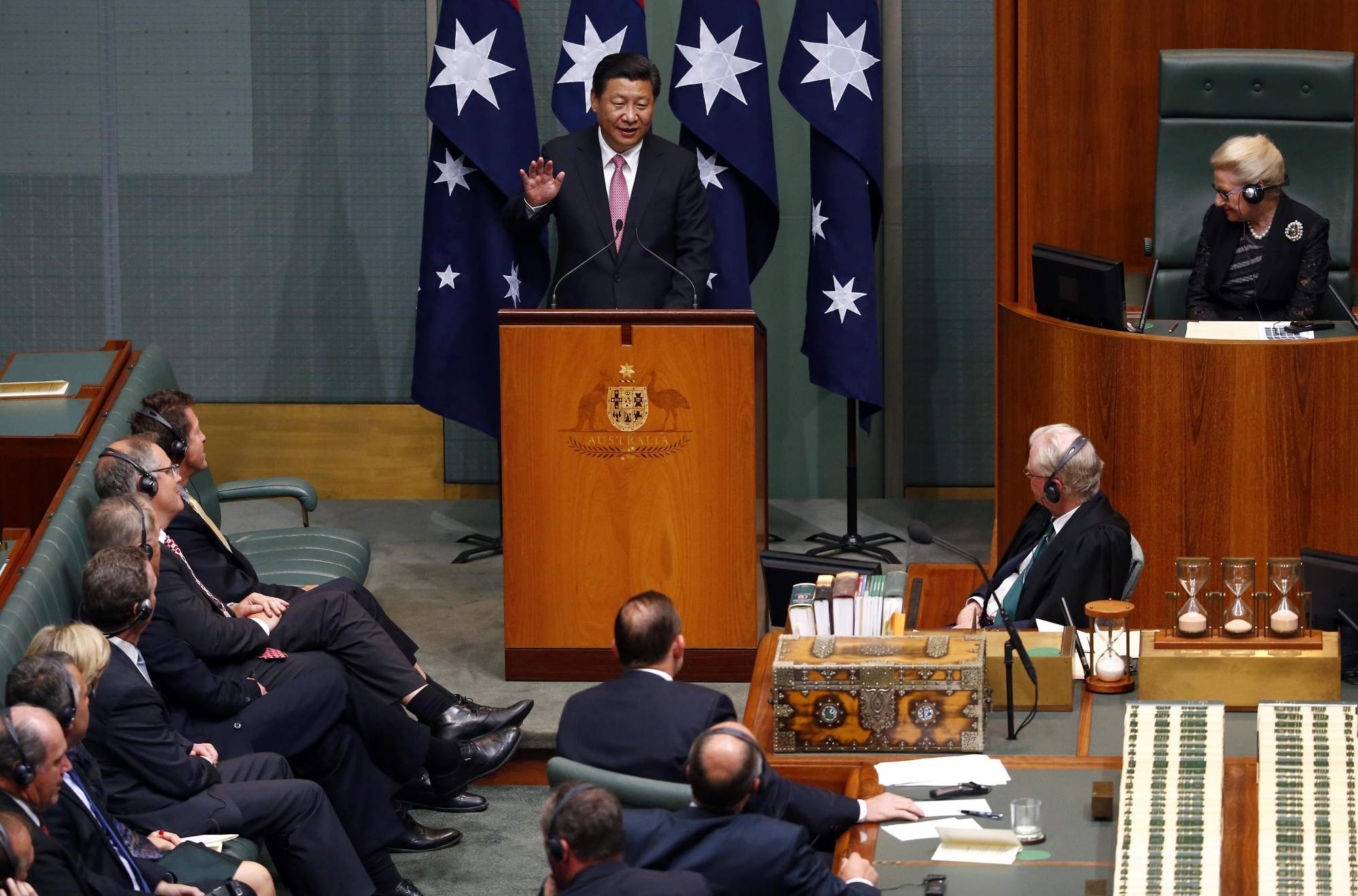Australia owes its economic boom to China, and it should think twice about moving on
- After recent tensions, Australia’s new relationship with China can be described as blind political adventurism mixed with juvenile opportunism – and it will regret this

Australia’s Prime Minister Anthony Albanese and China’s President Xi Jinping shake hands before a bilateral meeting on the sidelines of the G20 Leaders’ Summit in Bali, Indonesia, on November 15. Photo: EPA-EFE
Australia and China are set to mark 50 years since establishing diplomatic relations in 1972. What should have been a celebration of a blossoming exchange of economic, cultural and academic endeavours between the two countries will, instead, be marked by a .
The late 1970s and much throughout the 1980s were transformative years for both countries, as Australia began deregulating its industries and opening up to the world around the same time Deng Xiaoping embarked on revolutionising China through its open-door economic policy.
As a result, Beijing needed resources to build the country from the ground up. Australia, conveniently located, had an abundant supply of raw materials for construction, industrialisation and the transformation of China from an agrarian society to a global manufacturing hub.
The win-win trading formula touted by Beijing allowed Canberra to experience exponential growth as a by-product of its success, shielding the country from the 1997 Asian financial crisis and 2008 global financial crisis. China is Australia’s largest export partner, with iron ore and coal exports accounting for 57 per cent of total exports before the Covid-19 pandemic.
From 1995-2015, Australia’s economy grew three times faster than Japan, twice as fast as Europe, and one-third more quickly than the United States. Before Covid-19, Australia for Chinese tourists, with 1.43 million visiting the country in 2019, residing for extended periods and spending more than other nationalities.
As a result, by 2017, passenger airlines that flew between the two countries had increased to 15 airlines from four in 2009. There were also 200,000 Chinese students studying in Australia, accounting for one-third of .
Relations peaked in 2014 when President Xi Jinping . A defining feature between the countries until 2017 was having no outstanding historical, political or economic grievances, which was a rarity in international relations.

Australian prime minister Tony Abbott (centre) and other members of parliament listen at Parliament House in Canberra on November 17, 2014, as Chinese President Xi Jinping speaks, after the two countries signed a declaration of intent on a landmark free trade deal. Photo: Reuters
But Australia’s insecurity and fantasy about being invaded (which has historically extended to Japan, Indonesia and now China) caused a monumental shift when it took an abrasive position with its , aimed at the country.
The Australian government has gone on to from bidding for its 5G network, on the origins of Covid-19, the memorandum of understanding signed by the Victoria state government to join the Belt and Road Initiative, and takeover bids by Chinese companies despite the deals being cleared by the Australian Competition and Consumer Commission.
Australia’s current relationship with China can be described as blind political adventurism mixed with juvenile opportunism. Australia’s economy was hit with its two years ago and continues to struggle.
After rabid opposition to China in the past few years, Canberra now seeks to lift which have jolted its economy and are bound to increase pain as Australia prioritises ideology in aligning with the US over trade and the well-being of people in affected industries.
Trade ‘only one part of the battle‘ in China-Australia dispute, says legal expert Bryan Mercurio
The US has been in Northern Australia, creating a secondary logistics hub similar to Guam. As Canberra grins ear to ear in becoming the for the US, it is losing its middle-power status in the eyes of Beijing, and its impartiality in playing a leading role in de-escalating tensions between the great powers if an event were to emerge regarding Taiwan.China has maintained its one-China policy from the outset and intends to reunify with its territories, a “” explained very clearly since establishing diplomatic relations with countries such as Australia, which on that recognition.
Think tanks such as the Australian Strategic Policy Institute continue to antagonise rather than resolve tensions, suggesting the country buy 12 recently unveiled B-21 stealth bombers to counter China’s ballistic missiles. Such rhetoric is ill-conceived, especially as Australia’s Defence Force spends A$14 million (US$9.5 million) a year buying Chinese-made uniforms, safety goggles and gloves.
The next 50 years will probably see further attempts by Australia to diversify away from China. But it will quickly realise that no nation has the hunger or appetite for natural resources as China does. When the dust settles and Australia recovers from its self-inflicted wound, it will realise that China has the world to trade with, but Australia’s economic success was made in China.


